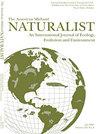A Multi-year Adult Emergence Study of the Cicada Neotibicen canicularis (Harris) (Hemiptera: Cicadidae) in Wisconsin
IF 0.6
4区 环境科学与生态学
Q4 Agricultural and Biological Sciences
引用次数: 0
Abstract
Abstract. Based on daily collections of final instar exuviae, the widespread annual cicada adult emergence of Neotibicen canicularis (Harris) (Hemiptera: Cicadidae) was studied in southeastern Wisconsin in a combined plot containing 15 mature trees and suburban lawns for seven successive years and in a separate plot of two trees for four years. The daily numbers of males and females were recorded. Over the entire seven years of the 15-tree plot, total female and male exuviae were equal, a summative 50:50 ratio. However, there was considerable deviation from this ratio three of the seven years. More females than males eclosed in the first two years and more males eclosed in the final year, yet the overall trend was for females to eclose later than males for the entire seven-year study of the 15-tree plot, with many more females emerging in the last twenty plus days. Although ambient temperatures varied over the study (cooler in the first two years and warmer later), they did not have any discernible effect on the timing of female and male eclosions. The overall annual emergence period was 56.7 (se 4.48) d for a seven-year total of 2967 exuviae, with the annual average emergence being 437.6 (se 34.6) per year. The average density of exuviae, an estimate of the emerging adult population, was 1.3 ± 0.09 (se) per m2. In the separate two-tree plot, a greater number of males emerged than females for all four years. ARISTOTLE ADVISES: “Male cicadas are tastier when young, but the females are preferable later when they are full of eggs.”美国威斯康辛州新蝉(半翅目:蝉科)成虫羽化多年研究
摘要根据对最终龄蜕皮的每日收集,在威斯康星州东南部一个包含15棵成熟树木和郊区草坪的组合地块上连续7年,以及在一个包含两棵树的单独地块上连续4年,研究了新犬齿蝉(半翅目:蝉科)每年广泛出现的蝉成虫。记录每天的雄性和雌性数量。在15棵树的整个七年里,雌性和雄性的蜕皮总数是相等的,总和比例为50:50。然而,在七年中的三年中,这一比例出现了相当大的偏差。在前两年羽化的雌性比雄性多,在最后一年羽化的雄性也多,但在对15个树区的整个7年研究中,总体趋势是雌性羽化晚于雄性,在最后20多天出现的雌性要多得多。尽管环境温度在研究期间各不相同(前两年较冷,后来较暖),但它们对雌性和雄性羽化的时间没有任何明显影响。总的年出芽期为56.7(se 4.48)d,7年共有2967个出芽,年平均出芽437.6(se 34.6)/年。蜕皮的平均密度是对新兴成年人口的估计,为1.3±0.09(se)/m2。在单独的两棵树的地块中,在所有四年中,出现的雄性数量都多于雌性。ARISTOTLE建议:“雄性蝉在年轻时更美味,但雌性蝉在产卵后更美味。”
本文章由计算机程序翻译,如有差异,请以英文原文为准。
求助全文
约1分钟内获得全文
求助全文
来源期刊

American Midland Naturalist
环境科学-生态学
CiteScore
1.20
自引率
0.00%
发文量
38
审稿时长
18-36 weeks
期刊介绍:
The American Midland Naturalist has been published for 90 years by the University of Notre Dame. The connotations of Midland and Naturalist have broadened and its geographic coverage now includes North America with occasional articles from other continents. The old image of naturalist has changed and the journal publishes what Charles Elton aptly termed "scientific natural history" including field and experimental biology. Its significance and breadth of coverage are evident in that the American Midland Naturalist is among the most frequently cited journals in publications on ecology, mammalogy, herpetology, ornithology, ichthyology, parasitology, aquatic and invertebrate biology and other biological disciplines.
 求助内容:
求助内容: 应助结果提醒方式:
应助结果提醒方式:


